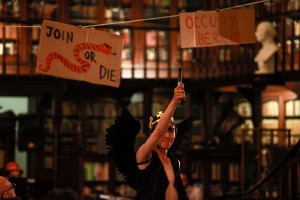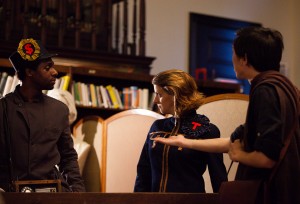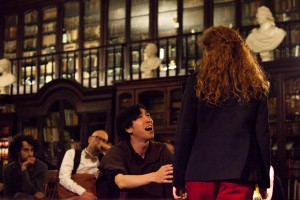
Director Manon Manavit had not heard of Heinrich von Kleist when she found a copy of his Michael Kohlhaas on a street in Montreal. It’s easy to understand why she was attracted to the text, which she adapted into MICHAEL THE REBEL for her new Philadelphia company, Humble Treasure Productions.
The story of a 16th-century horse dealer driven to revolt by bureaucratic ineptitude, Kleist’s 1810 novel is an example of the German Romantic movement known as Sturm und Drang. (Exemplified by Friedrich Schiller and Goethe, it is imprecisely translated as “storm and stress”.) “It is said to be a true story,” says narrator Brendan Norton, “which is to say it had to happen—it need not have happened.”

MICHAEL THE REBEL is packed with such resonating phrases: about bureaucracy, obsession, fame, fate—and the futility of fighting all of this. On the state’s response to revolt: “A man is doing violence because of injustice, the solution is not to stop the injustice but to add to the violence.” As an omniscient narrator, Norton has many of the best lines, and he delivers them with a snide joy.
The narrator’s gems weave through vignettes which see the poorly treated Kohlhaas (Richard Chan) become infatuated with obtaining justice from the oblivious aristocrat Wenzel von Tronka (Chris Davis). Manavit and her cast, who developed the three-act piece, draw comparisons between these events and modern progressive politics (“Occupy Berlin” reads one protester sign). Modern dress (Amelia Williams) and language pervade, and live original music by Jesse Kennedy and Andrew Thomas joins a soundtrack of indie classics: Brian Jonestown Massacre, Massive Attack, DJ Shadow.
The ensemble uses the charming confines of the German Society of Pennsylvania’s library to great effect. Action moves across the floor, onto the balcony, through the stacks. The second-act scene of revolt sees paper torn and strewn across the floor and books stripped from their shelves in a glory of organized chaos.

But this scene is a rare moment when MICHAEL THE REBEL justifies the dramatic moniker Sturm und Drang. Despite the superficial updating, the production stays heavily wedded to Kleist’s original story, and the characters are mostly played with neither the naturalism to engage nor the joyful farce of absurdism. Too often the narrator is telling us what we see onstage: inventive puppet plays scattered through the show (puppet art by Mariah Welch) act out the narration instead of driving the story.
There is much to admire in Humble Treasures first Philadelphia effort: clever use of space, smart language, and some inventive performances. Chris Davis’s perfectly silly turn as the rich junker adds some welcome humor. Thierry Santine’s take on Martin Luther updates the original protestant monk into a fiery black preacher.
Manavit has attempted a supremely ambitious undertaking: creating an contemporary, relevant piece of absurd theater out of a near-forgotten centuries-old text. That she comes tantalizingly close bodes well for the young creator’s career. [German Society of Pennsylvania, 611 Spring Garden Street] June 5-8, 2014; michaeltherebel.tumblr.com.
